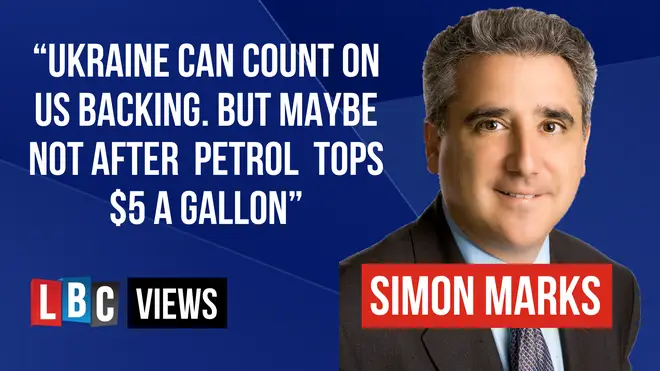
Ian Payne 4am - 7am
28 February 2022, 14:27

As Russian jets once again streaked across Ukraine’s skies and Putin’s marauders continued their murderous efforts to topple the government of Volodymyr Zelensky, President Joe Biden spent the weekend at home in Delaware.
The President rarely spends a full weekend at the White House. He enjoys his creature comforts back in Wilmington. He also makes it a regular part of his weekend routine to visit the grave of his late son Beau and to attend Mass at a local church.
There was, however, more than a frisson of surprise created by his decision late on Friday to head home. The previous weekend, while the Russian leader finalized his plans to invade his neighbour, the President chose to remain at the helm in Washington.
Weekend meetings with his national security officials took place in the White House situation room. Square-jawed photographs of the President flanked by his top team were distributed to the press. The message was conveyed to Americans that the Commander-in-Chief was firmly on-deck.
This weekend, not so much. As air raid sirens again sent residents of Kyiv and the country’s other major population centres scurrying into bomb shelters, underground stations and seeking whatever other safety they could find, President Biden has mostly kept his counsel.
Since the Russian invasion began, countries closer to the action have been leading the response. German Chancellor Olaf Scholtz was the first to announce meaningful sanctions, freezing the certification of the Nord Stream 2 pipeline.
News that Vladimir Putin and his servile foreign minister Sergei Lavrov were to face personal sanctions broke first in Brussels, then London. It was several hours before the White House confirmed the Biden administration was matching the decision.
The Prime Minister’s video address to Ukrainians released by Downing Street on Friday has not been accompanied by a similar message from President Biden. The US leader, to date, has made no effort directly to address those citizens courageously battling to save their nation.
Equally remarkable, at no point has the US President or Secretary of State Antony Blinken explicitly demanded that the Russians immediately withdraw their troops from Ukraine and observe a cessation of hostilities. In interviews last week, the Secretary of State made not a single demand of the Russian President.
The State Department has now generated readouts of numerous Blinken conversations with international colleagues: none of them notes that the Secretary of State called on Russia to lay down its weapons. In fact, the only way we know the
US favours a cessation of hostilities is thanks to a statement issued jointly by NATO’s government leaders late last week.
The failure overtly to call for one is starkly at odds with American tradition. President Barack Obama demanded the immediate withdrawal of Russian forces from Crimea in February 2014. President George W. Bush demanded the withdrawal of Russian forces from Georgia in 2008. Dealing with Saddam Hussein’s invasion of Kuwait, his father famously insisted that “this aggression will not stand”. The demands aren’t usually met, but they do at least get made.
There have also been contradictions inherent in White House pronouncements on Ukraine. On February 18th, when Biden said he was finally “convinced” that Putin intended to invade, he nevertheless also maintained that diplomacy could still succeed. White House officials then argued the first tranche of sanctions unveiled three days later were designed to deter Moscow from a full invasion. But when that invasion began 24 hours thereafter, Biden claimed “no one expected sanctions to prevent anything from happening”.
Foreign policy observers in Washington aren’t quite sure what to make of it. It could be a case of big match nervousness: the White House is still reeling from the aftermath of last August’s botched military withdrawal from Afghanistan and can’t afford another national security disaster on Biden’s watch. Biden certainly doesn’t want to be drawn into a military conflict with Russia, whose leader last week threatened the west with a nuclear strike.
Additionally, Biden knows the American public has no appetite for deep involvement in Ukrainian affairs. In an Associated Press / NORC opinion poll last week, just 26% of American voters said the US should assume a “major role” in the crisis.
Equally, the President may have wanted to spend his weekend crafting Tuesday night’s “State of the Union” address, and determining how best to couch the crisis in terms that convey its gravity to Americans, but also promises them it won’t lead to spiraling petrol prices here.
Last Thursday, when the President unveiled a fresh round of “strong sanctions” against Russia he indicated the careful balance that he’s attempting to strike. Addressing anxieties over the rising cost of fuel, he told Americans that he had specifically exempted energy payments to Russia from the sanctions regime. “I will do everything in my power to limit the pain Americans are feeling at the gas pump. This is critical to me”, he said, before adding that “America stands up to bullies. We stand up for freedom. This is who we are”.
Ukrainians, then, can count on U.S. backing. But not necessarily after the petrol price tops $5 a gallon.